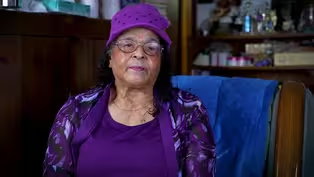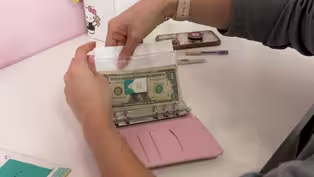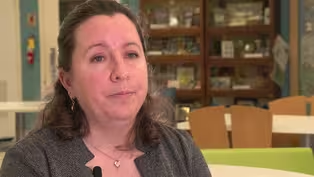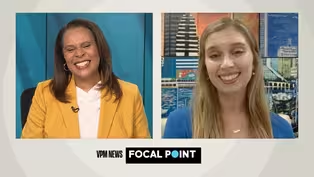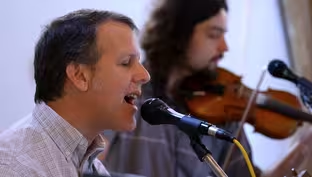VPM News Focal Point
Debt | March 28, 2024
Season 3 Episode 6 | 26m 46sVideo has Closed Captions
We’ll examine the complexities and challenges of debt in Virginia
How in debt are Virginians? How does debt impact a person’s well-being? We’ll examine the complexities and challenges of debt, including student debt, high interest loans, and the cost of renting versus owning.
Problems playing video? | Closed Captioning Feedback
Problems playing video? | Closed Captioning Feedback
VPM News Focal Point is a local public television program presented by VPM
The Estate of Mrs. Ann Lee Saunders Brown
VPM News Focal Point
Debt | March 28, 2024
Season 3 Episode 6 | 26m 46sVideo has Closed Captions
How in debt are Virginians? How does debt impact a person’s well-being? We’ll examine the complexities and challenges of debt, including student debt, high interest loans, and the cost of renting versus owning.
Problems playing video? | Closed Captioning Feedback
How to Watch VPM News Focal Point
VPM News Focal Point is available to stream on pbs.org and the free PBS App, available on iPhone, Apple TV, Android TV, Android smartphones, Amazon Fire TV, Amazon Fire Tablet, Roku, Samsung Smart TV, and Vizio.
Providing Support for PBS.org
Learn Moreabout PBS online sponsorshipANGIE MILES: For many Virginians, the quest for stress-free, care-free lives runs into hard financial roadblocks, as household debt has soared to record numbers nationwide.
We're taking a look at the scope of the problem, seeing how medical and student loan obligations can create heavy burdens, and how strategies and charities might lighten the load.
What to do about debt, straight ahead on VPM News Focal Point.
Production funding for VPM News Focal Point is provided by The estate of Mrs. Ann Lee Saunders Brown.
And by... ♪ ♪ ANGIE MILES: Welcome to VPM News Focal Point.
I'm Angie Miles.
Over the last decade, household debt in America has climbed steadily, ending last year at $17.5 trillion.
Credit card debt alone has set a record at more than a trillion.
and more people, especially young borrowers, have fallen behind on car payments.
This data comes from the Federal Reserve Bank of New York, but you may not need officials statistics to tell you that consumer debt, medical debt, and student loan debt are straining a lot of budgets.
Many of those caught in the web of debt are seeking ways to reach financial freedom.
On TikTok, an old school budgeting hack has gone viral, with Gen Z bringing back cash stuffing, also known as the envelope system.
For that, we turn to Multimedia Reporter, Keyris Manzanares.
JUDIA GRINER: I was able to pay off $14,000 of debt and while I was in school, I was able to actively pay off about $8,000 of tuition.
KEYRIS MANZANARES: But Judia Griner wasn't always a saver.
The 26-year-old living in Hampton admits that when it came to her finances, she winged it.
JUDIA GRINER: I was just as clueless as anyone else.
You can ask any of my friends.
They are shocked that people come to me for finance advice, 'cause like I'm terrible at math and I was an impulsive spender.
KEYRIS MANZANARES: Griner's financial journey was kick-started by a video about cash stuffing on TikTok.
Now, she runs her own account focused on the budgeting method.
JUDIA GRINER: So, cash stuffing is basically a physical means of budgeting.
So, you basically use cash, physical money, and you set aside a slew of envelopes and each envelope is going to represent a category within your budget.
So, for example, for me, I usually have stuff set aside for groceries, rent, and utilities.
KEYRIS MANZANARES: Cory Nichols, Founder and CEO of Yes Life Financial, says... CORY NICHOLS: I don't want to be a stereotypical millennial and blame our parents, but generally speaking, most of us have not had financial conversations leading up to this point and the school system didn't do a good job of making sure that we had personal finance courses, and so as a result, we're left to figure things out now and social media has been a great way to be informed on different strategies and methods and tactics to be able to achieve whatever financial goal you're leaning towards.
KEYRIS MANZANARES: But Nichols says he isn't a fan of cash stuffing, because people tend to take money from one envelope if they are running short in another budget area.
So, he advises people to track their expenses daily.
As for Griner, she continues using the cash stuffing method and inspiring others to do the same.
Her TikTok account has over 200,000 followers and many of her videos have garnered millions of views.
Reporting for VPM News, I'm Keyris Manzanares.
ANGIE MILES: Griner says, like any money management tool, cash stuffing can help curb overspending and improve budgeting.
Along with her TikTok account, she creates free downloadable savings tracker sheets to help people reach their goals.
ANGIE MILES: As individuals face spending challenges, are there ways our broader society might help?
We asked people of Virginia if there are things we can do collectively to assist others in decreasing or avoiding debt altogether.
BreASHA GRIFFIN: 100%.
I feel like if they had taught it in school or something, then I feel like a lot of things would've been avoided, because some stuff they end up making mistakes or going through with decisions that they didn't have a lot of knowledge on.
So I absolutely do think that some of the stuff can be taught in schools.
DEBRA HOUSER: No, because they got themselves in debt.
So let 'em, whatever happens, let it happen.
SHANTELL CARTER: And I'm not going to get cable in your name and expect whoever to pay the bill and I used it, 'cause it doesn't work that way.
You put yourself, just like you dig a hole, you get yourself out of it.
This is how it works.
It's life.
Life be life, and it is what it is.
DARCY ASHMAN: I think a lot more could be done, church groups, you know, youth groups, schools, you know, just to educate people of how to manage their money.
CRYSTAL BLINKINSOPH: I think healthcare is probably the biggest one.
Everybody gets sick, everybody wants to stay healthy, and everyone's afraid to go to the doctor because it's very difficult to keep up with those bills, especially if you really do need some help from the healthcare system.
ANGIE MILES: What happens when you or a loved one gets sick?
For so many, the struggle to pay for mounting medical bills is an added strain.
One survey shows that Americans owe at least $220 billion in medical debt, and nearly one in 10 Virginians is dealing with healthcare-related debt.
Multimedia Reporter Billy Shields, spoke with people trying to find solutions.
BREANNE ARMBRUST: This is our large meeting room.
BILLY SHIELDS: Breanne Armbrust is the executive director of the Neighborhood Resource Center inside this small storefront in the Fulton area of Richmond.
Its members often come to the organization in dire need.
BREANNE ARMBRUST: We have a computer lab that we use for individuals to apply for positions and...
Many of our members end up going to the emergency room for their typical care because they may not have a primary care provider.
Most of our members come to us uninsured.
BILLY SHIELDS: She remembers one member who had mounting medical debt which may have contributed to even more health issues.
BREANNE ARMBRUST: They had already been approved for the bankruptcy, and were in the bankruptcy process of paying down, you know, their debt with an agreement.
That individual over the course of the first few months that I was working with them, experienced a heart attack.
BILLY SHIELDS: It's something that creates an all-too-familiar problem, the problem of medical debt.
BREANNE ARMBRUST: Thinking ahead to think that in some point in the future I may have a medical catastrophe is, you know, something that I do think our members do, but it's a choice between paying for health insurance for something that might happen or paying for your rent or buying food.
LAURA ALRIDGE: I would say the majority of our clients do have medical debt.
It's something that we see frequently, and it is one of the leading causes, if not the most leading cause, of people filing for bankruptcy.
BILLY SHIELDS: Laura Alridge is a bankruptcy lawyer at the Boleman Firm in Richmond.
She says many different life events can precipitate a health emergency that takes someone over the edge.
LAURA ALRIDGE: It can also be the loss of employment or the breakup of a family unit, but certainly medical debt plays a very, very large role, and sometimes what people do is they start paying the medical debt with their credit cards.
BILLY SHIELDS: Bankruptcy is the most common legal remedy.
Alridge volunteers her time providing pro bono legal assistance for CancerLINC, a Richmond nonprofit that helps people with the financial repercussions of a cancer diagnosis.
CHRIS WILLIAMS: One example may be someone who's working an hourly labor job who tells their employer that they need to take time off for treatments, and after they do that for a certain amount of time, many times we'll have an employer who then tells that employee, "Well, you need to resign because we can no longer allow you to take time off," and generally, of course, those folks, when they're not on the job, they're not being paid, so debt happens there and then they lose their job, so they have no income.
BILLY SHIELDS: Chris Williams remembers having a migrant man approach him for help.
CHRIS WILLIAMS: And went to the hospital and was diagnosed with malignant cancer, brain cancer, and his decision immediately was to not be treated for that cancer because he knew the financial effects that he would leave for his wife and child, and that just, it tore me up.
BILLY SHIELDS: Armbrust was part of an innovative solution to medical debt.
BREANNE ARMBRUST: Last year, we participated in an effort with an organization called RIP Medical Debt, and they purchased, they're a nonprofit that purchases debt portfolios of medical debt, and then they abolish it.
BILLY SHIELDS: She knows this situation all too well.
She says she was lucky to have insurance that spared her from taking on medical debt.
BREANNE ARMBRUST: I've experienced that.
I was privileged when I was younger to work in environments where I had very, very good healthcare, and so when I experienced a brain tumor that I had to have surgery for, I had to have two brain surgeries over the course of five years, and the last one resulted in a stroke.
When I added up all of those medical bills, it would've been over $2 million for me out of pocket if I didn't have the health insurance that I had.
Even for people that have private health insurance, we have a system that is damaged.
BILLY SHIELDS: So, what can be done to address this?
LAURA ALRIDGE: Obviously, the system is broken.
BILLY SHIELDS: Alridge and Armbrust both use different means to help people facing medical debt.
Whether out of a Northside law firm or in Fulton Bottom, both women say suffering from chronic debt should not be an affliction of its own.
For VPM News, I'm Billy Shields.
ANGIE MILES: The Consumer Financial Protection Bureau estimates that about $90 billion of unaddressed medical bills have been lowering individuals' credit scores in recent years.
However, since July, 2022, medical account reporting rules have been changing, slowly becoming more favorable for consumers.
ANGIE MILES: VPM News Focal Point is interested in the points of view of Virginians.
To hear more from your Virginia neighbors, and to share your own thoughts and story ideas, find us online at vpm.org/focalpoint.
ANGIE MILES: Getting a college degree can bring feelings of great accomplishment, but it can also saddle a person with decades of debt.
Most students have to borrow money to afford higher education, and more than 1 million Virginians have unpaid federal student loans.
As VPM News Reporter Megan Pauly discovered, the burden of that borrowing can be crushing.
(basketball thudding) YVONNE EVANS: Wow, Zuli, good girl, good girl.
MEGAN PAULY: 76-year-old Yvonne Evans has been trying to pay off student loans for nursing courses she took at Southside Virginia Community College over 30 years ago.
YVONNE EVANS: The loan going to be here when I'm dead and gone.
There's no way I can pay it off.
I'm not working now.
Whole stack over here, let's see.
MEGAN PAULY: Her original balance from 1989 was around $5,500 and has ballooned to nearly $35,000 with interest.
Evans now has to pay more than six times her original loan amount.
YVONNE EVANS: I get these every month, every month.
You know, I want to feel of value and pay my bills, but I'm just at a standstill.
I never thought this would happen to me for almost 13 years, taking care of my mom.
I didn't ask anybody for anything, but now I pray so hard, it just look like my prayers are not being answered and I just don't know what to do.
What I'm holding in my hand is my diploma.
MEGAN PAULY: Evans was eventually able to earn her bachelor's and master's degrees for free at other Virginia universities, thanks to the Brown v. Board of Education Scholarship Program, which was created by Virginia's legislature in 2004.
It was given to students locked out of Virginia schools when districts closed to avoid court-ordered desegregation laws in the 1950s and '60s.
But Evans hasn't been able to use the degrees she earned over the years because she had to become a full-time caregiver for relatives who were having health issues.
Most recently, she's had a hard time finding work while helping care for her grandkids, yet she still gets monthly student loan bills.
JAY SPEER: There's this huge mindset about go to college and make yourself better and this will be good for you and all this sort of thing, and then people wind up in debt, huge amounts of debt and worse off.
MEGAN PAULY: Around 20% of students who enroll in Virginia colleges drop out within the first year, often with debt and earning low wages.
Jay Speer has been helping Virginians with various types of debt for 24 years at the Virginia Poverty Law Center.
He says the collection tactics associated with student debt can be intimidating and overwhelming.
JAY SPEER: There's actually been a pretty long history of student debt collection being much harsher than any other kind of debt collection.
If your only income is social security, no debt collector can take your bank account or garnish your social security money, except the federal government if you owe them for a student loan.
MEGAN PAULY: There's another type of student debt that can have an equally devastating impact much earlier in life, though it's not federal student loan debt, it's debt owed directly to colleges and universities and often referred to as direct-to-school debt.
JAY SPEER: Pretty typically, the person left college for what anyone would think is a valid reason.
They were sick, their mom was sick.
Somebody told me once that they were being stalked, you know, all kinds of things that I don't think anybody would fault them for leaving school.
They were just shocked when they came back later and tried to get their degree and found out that they either couldn't apply somewhere else because they weren't able to get the transcripts or they weren't going to get credit.
I mean, some really fairly heartbreaking stories.
MEGAN PAULY: Salona Perkins was in foster care until age 16 and was solely responsible for paying for college.
She had her transcript withheld from Virginia Commonwealth University in 2019.
Because Salona's GPA was just shy of the required 2.0 at the end of her third semester, VCU sent her federal financial aid back to the federal government.
This is a common reason students end up with direct-to-school debt.
Perkins ended up with a balance of about $9,000 directly to VCU, not to mention an additional $2,000 in collection fees.
SALONA PERKINS: Not being able to finish my courses at VCU did take a toll on me mentally.
You have all your friends who have succeeded and you just feel left out.
You have to drop all your courses, you have to move out, you have to move back into your parents' house, and your freedom that you once had is gone, so it did take a toll on me mentally.
Not only that, I had to figure out a way how I'm going to pay $9,000 back with the jobs I go to every day.
It was just a lot emotionally and mentally.
I was only 19, 20 and I felt like I was in some sort of midlife crisis.
I had this plan set for myself and it was, 'What am I going to do now?'
MEGAN PAULY: Eventually Perkins decided to go back to school at J. Sargeant Reynolds Community College, but she had to repeat multiple classes since VCU withheld her transcript.
SALONA PERKINS: Having to redo classes is a very frustrating thing because no one wants to redo classes that you've already taken and paid for.
Also, with the schedule that I have, it's time-consuming to have to redo all those classes again.
MEGAN PAULY: Federal regulations that bar colleges from withholding transcripts for credits already paid for go into effect this summer.
State lawmaker Delegate Betsy Carr also sponsored a bill this year to require universities to release transcripts of all credits, paid for or not, to a student's employer or prospective employer.
BETSY CARR: As a lawmaker, this is important so that we get our students graduating and into the workforce and sometimes student debt to the institutions would hold them back and they couldn't be able to move forward in the way that they would like to to get their jobs, and one piece of that is not being able to get their transcripts from an institution because of direct debt to the institution.
MEGAN PAULY: Carr's legislation also prohibits transcript withholding for debts under $500 and under $1,000 for Pell Grant recipients, and also when a student has set up a payment plan and made three consecutive payments.
The bill has strong support and passed the Senate unanimously.
Only two lawmakers opposed it.
BETSY CARR: Everybody was on board with this, everybody.
No one is kind of holding back on this 'cause everybody wants our students to move forward and to become who they can become, so I think that everybody will be cooperating to make this happen.
MEGAN PAULY: Salona Perkins testified in the General Assembly in support of the bill in 2022.
Even though Perkins couldn't get her transcript, she hopes the legislation will help other students who are stuck in similar predicaments and she says her experience advocating for Delegate Carr's legislation inspired her to focus her career on the legal profession.
SALONA PERKINS: I do want to succeed in school, whether I stop here at paralegal studies or I go to that university and continue law, I do want to succeed.
I feel like I cannot give up what I want out of life.
I feel like I have to work for it and that's the only way it's going to happen if it's if I keep going.
MEGAN PAULY: For Yvonne Evans, the student loans that have been hanging over her head for over 30 years still cause sleepless nights.
YVONNE EVANS: I have lost so much sleep with this loan and it just look like God has given me some kind of relief as to stop worrying 'cause I really have lost a lot of sleep worrying about this loan and I just don't worry about it anymore.
If I want to continue to get older, then I need to stop worrying.
MEGAN PAULY: But Evans is not worried about her grandson.
YVONNE EVANS: I am very, very proud of my grandson.
My second grandchild is going to college for engineering and he won't have to pay anything, nothing at all, and I am so happy about it.
He's got several scholarships and I am so proud of him.
Delegate Carr's bill passed the Virginia House and Senate, and awaits approval by Governor Youngkin.
A spokesperson for his office told VPM News that, "The Governor is closely reviewing the legislation and budget language sent to his desk, but believes students should be able to provide prospective employers proof of educational attainment, so they can obtain a job and have the financial resources to meet their financial commitments and provide for themselves and their families."
As for Yvonne Evans and Salona Perkins, they both continue to struggle with their student debt.
ANGIE MILES: On average, college graduates living in Virginia owe about $40,000 in student loans.
But our guest, Taylor Hayes, owed $60,000 when she graduated from James Madison University in 2015.
Taylor managed to pay off her debt in five years and is now a web developer.
She's here to tell us how she did it and how others might be able to diminish debt of all types.
What was your reaction when you realized how much money you owed?
TAYLOR HAYES: First, I learned about it, and I just thought, 'I guess this is just part of my life now.'
ANGIE MILES: Talk about that moment when the switch flipped and you got the idea, "Oh, I can just pay these off."
I ended up stumbling upon what's called the zero-based budget, which is essentially just taking your monthly income and subtracting from that your monthly expenses.
And if you have any money left over, that can be put towards your debt.
But if you don't have any money left over, it might be time to start cutting your expenses or increasing your income.
ANGIE MILES: What kind of resources do you have for people who want to learn more?
TAYLOR HAYES: One of the most helpful things that I did, if not the most helpful thing I did, was I searched for hashtags.
And I stumbled across a hashtag on social media called Debt Free Community or DFC, and what I came to realize was there are thousands upon thousands of people, no matter what kind of background, age, anything, that are paying off their debt and they're determined.
And just seeing all of these people, one, opened my eyes to, 'Wow, there are so many people out here who are just like me that really want to get out of their debt.'
And you get to network with all of these people if you'd like, and you just encourage each other and motivate each other, and it helps you feel so much less alone.
(upbeat music) ANGIE MILES: You can watch the full interview on our website.
ANGIE MILES: In a pastoral setting, in Charles City County, a small church congregation recently completed a mighty task, working with one another with partner churches and through a nonprofit called RIP Medical Debt.
Peace Hill Christian Fellowship helped to retire almost $2 million of delinquent debt for people living in Eastern Virginia.
Pastor Justin Moore spoke with us about how they did it, and why.
(gentle music) ♪ I bind unto myself today JUSTIN MOORE: We were very much inspired by Isaiah 58, where the prophet Isaiah says that the kind of religion that God likes best is the kind that frees people from unjust and oppressive systems, and the kind that lifts burdens off of people.
It says that that's the the kind of service that God really wants.
We all have many temptations that try to persuade us that some other thing is worth devoting our lives to and they all promise big, shiny rewards, and then they don't really deliver what they promise, or...
In conjunction with other churches and groups and individuals, we raised about $14,000.
Through the way that RIP Medical Debt leverages it it was able to pay off, I believe, almost $2 million of medical debt for people in Charles City, New Kent County, James City County, and Henrico County.
They got a letter that said, Your medical debt has been completely wiped out, and you won't owe it.
You won't face any tax penalty for having it paid off or anything.
So we were just so excited to be able to raise that money and have that happen.
I encourage you this week and this season of Lent to be Christ for each other, to imitate Christ...
This was not just a one-church operation.
In Williamsburg there was St. Martin's Episcopal Church, and then in Charles City there was St. John Baptist Church and the River Outreach Center and Westover Episcopal Church.
And then, as I said, many individuals from around the state, and even some from around the country who donated.
♪ For all my dreams in my darkest hour ♪ JUSTIN MOORE: I think that this campaign was eye-opening for the folks in our congregation, and everybody joined in from the kids to the oldest members.
And we had people, you know, kids contributing a little bit.
And I think it stretched us because we're thinking now, not just in terms of people's immediate needs, like, you know, like food and groceries at a food pantry, which we're happy to help out with, but things that are keeping them from moving forward on their own, like medical debt that can hold them back and can keep them from thriving.
And so it's not just about giving someone something that'll help them for a moment, but about maybe removing an obstacle or a barrier that was keeping them from thriving.
And so people were really excited to get involved in that.
And it energized the whole congregation.
We were amazed.
(gentle music) Amen.
CONGREGATION MEMBERS: Amen.
ANGIE MILES: Similar medical debt relief efforts are happening nationwide.
Here in Virginia, the Secular Society announced recently its members wiped out $12 million in medical bills for more than 14,000 Southwest Virginians.
We've shown you how debilitating debt can be for some, and discussed ways people can empower themselves to shake free of some of those shackles.
Please, share your thoughts on our coverage and your story ideas as well.
Go to vpm.org/focalpoint.
There, you'll find the full interview with Taylor Hayes on how to eradicate debt.
We hope to see you again next time.
Production funding for VPM News Focal Point is provided by The estate of Mrs. Ann Lee Saunders Brown.
And by... ♪ ♪
Mounting college debt weighs heavily on borrowers
Video has Closed Captions
Clip: S3 Ep6 | 7m 42s | More than 1 million Virginians owe student loan debt, which can linger for decades. (7m 42s)
Virginia woman cuts debt by cash stuffing
Video has Closed Captions
Clip: S3 Ep6 | 2m 7s | What is cash stuffing? A TikTok trend helped a Virginia woman cut down her college debt. (2m 7s)
About nine percent of Virginians deal with medical debt
Video has Closed Captions
Clip: S3 Ep6 | 4m 41s | More than half a million Virginians have medical debt, which can lead to bankruptcy. (4m 41s)
How community could help you tackle debt
Video has Closed Captions
Clip: S3 Ep6 | 9m 6s | JMU graduate says finding the right community helped her pay off $60,000 college debt. (9m 6s)
Small church helps pay debts of neighbors
Video has Closed Captions
Clip: S3 Ep6 | 3m 12s | Churches working together raise enough to wipe out nearly two million in medical debt (3m 12s)
Providing Support for PBS.org
Learn Moreabout PBS online sponsorship
- News and Public Affairs

Top journalists deliver compelling original analysis of the hour's headlines.

- News and Public Affairs

FRONTLINE is investigative journalism that questions, explains and changes our world.












Support for PBS provided by:
VPM News Focal Point is a local public television program presented by VPM
The Estate of Mrs. Ann Lee Saunders Brown
